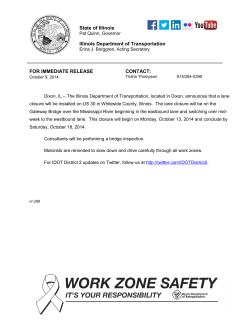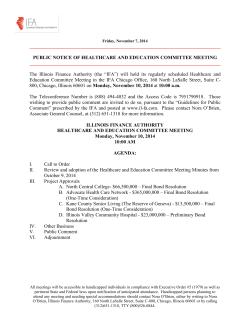
Illinois power players gear up as Clean Power Plan standards
CQ.com - Illinois Power Players Scramble as Carbon Rule Looms 5/8/15, 5:37 PM Add your own content to CQ's data. And so much more. CQ+, our new workflow tool, is here, allowing you to build custom reports and more. To help demonstrate its power, we've unlocked more of our content than you may subscribe to. This 'open access' runs throughout May. What's CQ+ mean for you? Find out here. CQ NEWS May 8, 2015 – 7:00 a.m. Illinois Power Players Scramble as Carbon Rule Looms By Ed Felker, CQ Roll Call As states look ahead to meeting Story Photo tough power plant carbon regulations from the EPA, debates are raging over which energy sources will power the coaldependent Midwest -- with one of the toughest to resolve underway in Illinois. It is among a group of states -including Ohio, Michigan, Indiana, Wisconsin and Minnesota -- that are weighing their options to use more Exelon's Byron Generating Station.(Getty Images) gas and renewables as they face carbon reduction targets ranging from 20 percent to 41 percent by 2030 under the EPA's Clean Power Plan. Illinois, with a 33 percent proposed cut, stands out because of its particularly thorny energy mix and footprint in two regional energy grids. With the most nuclear generation of any state, it gets about half of its electricity from atomsplitting at six Exelon Corp. stations, and much of the rest from coal-fired plants. http://www.cq.com/doc/news-4678366?19&print=true Page 1 of 7 CQ.com - Illinois Power Players Scramble as Carbon Rule Looms 5/8/15, 5:37 PM The debate is expected to reverberate throughout the region, say environmental activists, who are pushing the state to rely more on renewable energy in the coming years. Illinois "is really at a crossroads when it comes to the nation's energy," said Andrew Barbeau, a consultant to the Environmental Defense Fund, part of a coalition of groups pushing a green energy bill that would raise the state's renewable energy mandate to 35 percent by 2030. The Democratic-led state General Assembly has been wrapped up in a budget tug-of-war with Republican Gov. Bruce Rauner over a projected $6 billion deficit next year, so much so that it has yet to move forward on energy policy. But expectations remain high that legislative leaders will at some point address three competing energy overhaul bills. Exelon, renewable energy advocates and Exelon's utility subsidiary Commonwealth Edison have each proposed their own bill. Commonwealth is proposing a bill that would raise rates to pay for grid modernization. The Exelon bill would also increase rates to the tune of about $300 million a year, which it says is needed to keep three of its nuclear stations in operation. The bill has advanced out of the state Senate Energy and Public Utilities committee, the only action on any of the bills so far. Still, the slow pace has not stopped a lobbying war from breaking out inside and outside the state capitol. On Wednesday, the Illinois Clean Energy Coalition, an Exelon-funded advocacy group, bused in some 600 nuclear workers, community leaders and residents to Springfield to personally lobby for the company's proposal, titled the Low Carbon Portfolio Standard bill. The lobbying push came just a day after environmental groups and renewable energy firms that back the green alternative energy bill released a survey showing there has already been rapid growth in renewable energy and efficiency jobs. The group says more than 104,000 exist, up 7.8 percent from 2013. http://www.cq.com/doc/news-4678366?19&print=true Page 2 of 7 CQ.com - Illinois Power Players Scramble as Carbon Rule Looms 5/8/15, 5:37 PM The groups say their bill would add another 32,000 jobs, if enacted, while cutting rates for consumers. Exelon has called for action before the spring legislative session comes to a close at the end of this month, a target many don't expect to be met. Exelon executives have contended that the company can't wait until later this year to decide the fate of three plants it says are currently not profitable to run because of low natural gas prices and incentives for renewables, despite the overall profitability of the company. Exelon's bill would effectively require state utilities to get about 70 percent of their power from nuclear, which it says would maintain baseload generation while helping the state meet its Clean Power Plan target. The bill, however, is under fire by renewable advocates and state Attorney General Lisa Madigan, a Democrat, who call it a bailout to the company. Plant Closures Threatened David I. Fein, Exelon's vice president for state government affairs, reiterated at a hearing before the state Senate energy committee on Wednesday the company's intention to decide over the summer whether to close the plants in time to meet regulatory filing deadlines starting in September. The closures would cost about 8,000 jobs and $1.8 billion in lost economic activity, Exelon estimates, while driving up carbon emissions from replacement coal or gas plants. He called on lawmakers to reject arguments by opponents of the bill that the legislature should wait until two upcoming milestones. The first is EPA's final Clean Power Plan state targets and timetables, due this summer, and second is the annual electricity capacity auction by the PJM Interconnection, which coordinates supply among generators across 13 states and the District of Columbia. The company is in line for $13 million from the recent sale of reserve capacity from one of its endangered plants, in Clinton, Ill. That price was the result of the most recent auction by the Midcontinent Independent System Operator, which manages the grid in central and southern Illinois. http://www.cq.com/doc/news-4678366?19&print=true Page 3 of 7 CQ.com - Illinois Power Players Scramble as Carbon Rule Looms 5/8/15, 5:37 PM That auction saw a spike in prices that will cost consumers an estimated $150 per household in higher rates over the next year in the regions served by the Ameren Illinois utility, according to the state's electricity users' advocate, the Chicago-based Citizens Utility Board. Exelon has said, however, that the $13 million isn't enough to stem operating losses at Clinton and does not take the plant off the chopping block. "It's clear that there are many competing energy policy proposals before you, but none of us have the luxury of delaying or ignoring the urgent need to act now," Fein said. "Act now or we are going to lose a reliable source of electricity, the major source of zero-carbon electricity, and we need to now chart a path to a more energy-efficient and sustainable future for Illinois families and businesses," he added. But the need for fast action was challenged by Cara Hendrickson, chief of the public interest division for Madigan, who told the panel the push by Exelon is premature, with no actual regulatory deadline for Exelon to decide whether to close the plants. She noted that the state exports about 20 percent of its power generation, and that the lost power from the plants can be replaced over the long term without harming reliable service. Hendrickson said the bill also does not preclude Exelon from closing the plants, and the company has made no guarantee that it won't. "What does Illinois get for their $300 million a year? The answer is, not much," she said. "This is simply a bailout bill for Exelon, and it's bad public policy." Lawmakers did not indicate when they will try to jumpstart the energy reform process. Participants in the debate say privately that will come when the state's Democratic legislative leaders launch negotiations, likely not until after the budget fight is resolved. Until then, the lobbying war is expected to continue as all sides fight for the leverage of public opinion. http://www.cq.com/doc/news-4678366?19&print=true Page 4 of 7 CQ.com - Illinois Power Players Scramble as Carbon Rule Looms 5/8/15, 5:37 PM Doug O'Brien, a former chief of staff to U.S. Sen. Mark S. Kirk, R-Ill., during his first two terms in the House starting in 2001, and now the executive director of the Illinois Clean Energy Coalition, said his group is looking to get the attention of the entire General Assembly to hear arguments for the preservation of the Exelon plants, and not only the risks to local jobs if the plants close. "We want to expand that discussion to all 177 legislators to help them understand the impacts on our environmental policy, the impacts on our local economy, but also the ancillary benefits that go beyond" those realities, he said. "It means Illinois is uniquely positioned to be able to comply with new clean energy rules from the feds, it solidifies our position as the top producers of clean energy in the country." Gail Parson, Midwest advocate with the green companies group Environmental Entrepreneurs, which backs the Clean Jobs bill, said this week's report on state renewable and efficiency jobs shows an economic alternative exists to Exelon's push. It's one the state should adopt in advance of drawing up a plan to comply with EPA's carbon rule. "I think it will reverberate. Illinois can send a strong signal," she said. "State policy will form the backbone of a state implementation plan, and Illinois can really lead the way by showing that by reducing carbon emissions, we're really creating business." TAGGED: Clean Energy, Electric Grid, Energy Efficiency, Energy Efficiency Renewable Energy, Illinois, Michigan, Minnesota, Ohio, States Topics Nuclear Energy State of Play Follow Nuclear fission provides nearly 20 percent of the nation’s electricity, but advocates of nuclear energy say public policy should be focused on expanding that share. http://www.cq.com/doc/news-4678366?19&print=true Page 5 of 7 CQ.com - Illinois Power Players Scramble as Carbon Rule Looms 5/8/15, 5:37 PM Although touted as a low-carbon energy solution, nuclear energy faces challenges of high long-term cost, lack of waste repositories, competition from increasing renewable resources and increased availability of natural gas. Radiation released from the Fukushima nuclear plant in 2011 revived longtime fears of a meltdown, making new reactors a tougher sell in the realm of public opinion. Nuclear waste storage has long been a sticking point for the industry. The federal government spent more than $15 billion developing plans for a geologic repository at Yucca Mountain in Nevada, over the objections of the state. In 2010, President Barack Obama ordered a blue ribbon commission to evaluate alternatives and the Energy Department sought to halt plans for Yucca. A federal court has ordered the Nuclear Regulatory Commission to continue evaluating the Yucca proposal as long as funds are available. The House in the 113th Congredss passed spending plans that fund and continue the project – but anything that moves a Yucca Mountain plan along in the Senate did not move with Democratic Senate Majority Leader Harry Reid of Nevada holding the reins. In the meantime, nuclear power providers maintain waste at their sites at a projected cost of $15 billion through 2020 for the federal government and added costs to rate payers. Dive Deeper What are the biggest challenges to the nuclear power industry? Is nuclear power waning as an energy source? What about new reactor designs and fusion reactors? What is the state of U.S. nuclear power plants? EPA State of Play Energy Regulation The EPA's proposal to limit carbon dioxide emissions was published in State of Play the Federal Register on June 18, kicking off a nearly six-month public edfelker@cqrollcall.com comment period that elicited scores of passionate opinions from the Source: CQ News environmental community, industry groups and others. © 2015 CQ Roll Call All Rights Reserved. http://www.cq.com/doc/news-4678366?19&print=true Page 6 of 7 CQ.com - Illinois Power Players Scramble as Carbon Rule Looms 5/8/15, 5:37 PM Safari Power Saver Click to Start Flash Plug-in http://www.cq.com/doc/news-4678366?19&print=true Page 7 of 7
© Copyright 2025










